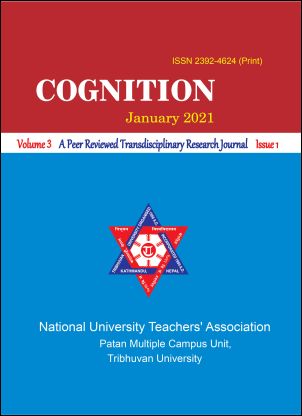Social Harmony and Integrity: An Advocacy of Universal Humanism in Rabindranath Tagore’s “Chandalika”
DOI:
https://doi.org/10.3126/cognition.v3i1.55633Keywords:
diversities, prejudices, universal humanism, caste, race, social harmony, Advocate, disparities, conflictAbstract
The world is replete with racial, regional, lingual, religious and cultural diversities. The terms racism, religiosity, caste divisions etc. are the social constructs rather than natural, by birth phenomena. This study examines Rabindranath Tagore’s Two act play – “Chandalika” focusing social harmony and solidarity as an integral aspect of universal humanism. Conceptualizing the theoretical frameworks of humanism that elevates human dignity and fraternity, this research attempts to display how the writer advocates the universal humanism through the social harmony and integrity in the play. Caste discrimination is still prevalent in Hindu culture, and racial, cultural and regional prejudices have had a long history in different the parts of the world. The conflict amid different castes, religions, regions and races has soared up in some parts of the world dismantling social harmony. When a human being regards and respects another human being regardless of diverse castes, races, religions, and cultural and regional disparities, it echoes the sense of universal humanism. This research explores Tagore’s ideals of social, religious and racial harmony as a part of universal humanism enshrined in the Text. It answers the question: how does the play Chadalika advocate the aesthetics of social harmony as a part of universal humanism? The prejudices and discriminations in the name of caste, races, regions and religions have wrought the world since long. Tagore appeals for the end of such prejudices through his play, thereby cherishing and nourishing universal humanism.




